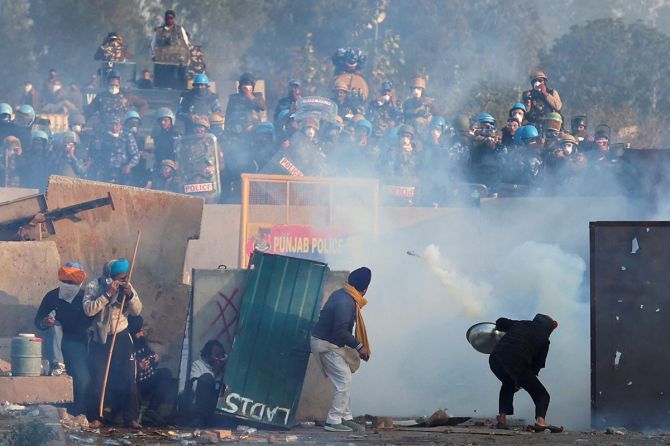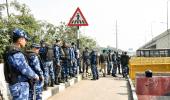The Delhi Police has placed orders for more than 30,000 tear gas shells, an official said, as the force prepares to prevent Punjab farmers from entering the national capital under their 'Dilli Chalo' protest.

Hundreds of farmers marching from Punjab have been stopped at the state's border with Haryana near Ambala, about 200 kilometers away from Delhi. Haryana security forces have used tear gas on them to try and disperse them.
A Delhi Police source said they are determined to not let the protesters enter the national capital should they advance.
As part of the preparation, the Delhi Police has already stocked up a large number of tear gas shells and ordered 30,000 more from the BSF's Tear Smoke Unit (TSU) located at Tekanpur in Madhya Pradesh's Gwalior, an official said.
The freshly ordered shells are being brought to Delhi from Gwalior, he said.
A tear gas shell is an anti-riot equipment which is used by security forces to disperse crowd. The gas brings tears by creating irritation in the eyes.
A stock of tear gas shell was also ordered before the G20 Summit held in September 2023, the officer said, adding, a fresh order has been given in the wake of farmers' agitation.
Another officer said the age of each tear gas shell is three years after which their impact slowly weakens, but they are used upto seven years for practice purposes by the forces.
Under the Delhi Police norms, once a stock gets acquired, the shells are distributed to the district police and other units of the force.
Another officer said that in view of the farmers' protest, the fresh stock may be distributed to the outer, outer-north and east district police -- under whose jurisdiction the potential protest sites in the national capital fall.
The Delhi Police has made all logistical arrangements to stop the farmers at the Singhu (Sonipat side), Tikri (Bahadurgarh side) and Ghazipur (Ghaziabad side) borders.
Tikri comes under outer, Singhu under outer-north and Ghazipur in east district.
The security personnel deployed at these borders are already equipped with a large number of tear gas shells, water cannons and other anti-riot equipment.
The personnel deployed at the borders have been strictly asked to ensure not a single farmer or their tractor-trolley enters into the jurisdiction of the national capital.
The Delhi Police has issued prohibitory orders under section 144 of the Code of Criminal Procedure (CrPC) for a month -- banning an assembly of five or more people, processions or rallies and the entry of tractor-trolleys ferrying people.
On the farmers who have gathered near the Shambhu border between Punjab and Haryana near Ambala, the Haryana police has also used tear gas shells, some of which they air-dropped through drones on protesting farmers.
The farmers seek to march to the national capital to press the Centre to agree to their various demands including a legal guarantee on Minimum Support Price of crops, implementation of the Swaminathan Committee report, loan waiver among others.
Duing their protest in 2020, farmers from different states, mainly Punjab, Haryana and Uttar Pradesh, had staged a sit-in at the Singhu, Ghazipur and Tikri borders. They sat there from August 2020 to December 2021.
Police had to rush logistics in 2020 to check the entry of the farmers moving in a procession of tractors.











 © 2025
© 2025